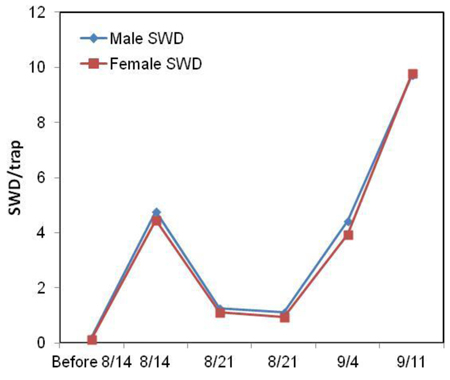Spotted wing Drosophila fly activity is increasing – be prepared in fall raspberries
Spotted wing Drosophila has been detected in two more Michigan counties. Fall red raspberry growers need to take appropriate management actions to protect their berries.
Recent monitoring for spotted wing Drosophila (SWD) in fruit crops around the state has detected this pest in two additional counties: at a cherry orchard that was well after harvest in Benzie County, and at a farm producing fall red raspberries in Washtenaw County. Additional captures have been made over the past few weeks at raspberry plantings in southwest, west central and central Michigan where fall red raspberries are being harvested, and growers are taking appropriate management actions to protect their berries.
Growers of fall red raspberries need to raise their level of awareness that SWD could be a pest in fruit yet this season, and trap monitoring should continue through to the end of harvest.
Michigan State University’s ongoing monitoring efforts and those of crop scouts indicate a sharp increase in fly activity during September (see graph below). In the past few weeks, a higher proportion of monitoring traps are catching flies, and captures per trap have increased in all monitored crops. The geographic spread of this pest has also expanded in the state.

Growers should also be on the lookout for this pest in fruit. Our campus organic raspberry planting under high tunnels has recently shown activity of SWD in traps and we quickly experienced infestation in berries. A quick response of harvesting and destroying the ripe fruit (by freezing), followed by an application of Entrust, has allowed harvest to resume.
A “Spotted Wing Drosophila Management Recommendations for Michigan Raspberry and Blackberry Growers” publication has been produced by MSU. That production guide has information on monitoring and control options in fall red raspberry production. That same publication and a great deal of other resources on SWD are also available at the MSU spotted wing Drosophila website.
Stay tuned for updates on SWD as we move through the fall. If you have any questions or think that you might have some suspected SWD on a trap at your farm, don’t hesitate to contact your local MSU Extension educator for assistance. Suspect flies can also be sent to MSU Diagnostic Services to get a determination.



 Print
Print Email
Email




